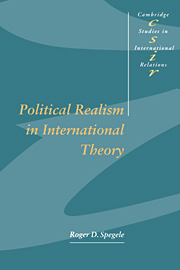1 - Theory and practice in international relations
from Part 1
Published online by Cambridge University Press: 30 October 2009
Summary
I have endeavoured rather to show exactly what is the meaning of the question and what difficulties must be faced in answering it, than to prove that any particular answers are true.
G. E. Moore, Principia EthicaIntroduction
The principal preoccupation of this chapter lies in establishing a tripartite classification of international relations which will be deployed in subsequent chapters. In contrast to other such schemes in international relations, the classification presented below brings methodological and practical-moral concerns into the same schema from the outset. The establishment and development of such a schema not only permits increased critical purchase on rival conceptions of international relations, it also allows criticism of certain versions of political realism. It will therefore move us towards Part 2 of this study where I will defend four theses of a new version of political realism. This is not to say that this classification scheme is ‘foolproof’ or without its own set of difficulties; nonetheless it succeeds, I believe, in focusing our attention on the sorts of issues which need to be reflected upon. And that is all that one should expect from a classification scheme. In this connection, I hasten to point out that this chapter is followed by two subsequent chapters to make up Part 1 which, in general, has two principal goals: first, to loosen the grip on the proponents of rival conceptions of international relations by casting them in a somewhat different light and indicating the difficulties to which they give rise and second, to prepare the ground for devising a substantially revised version of political realism which is coherent, viable and attractive.
- Type
- Chapter
- Information
- Political Realism in International Theory , pp. 3 - 21Publisher: Cambridge University PressPrint publication year: 1996



